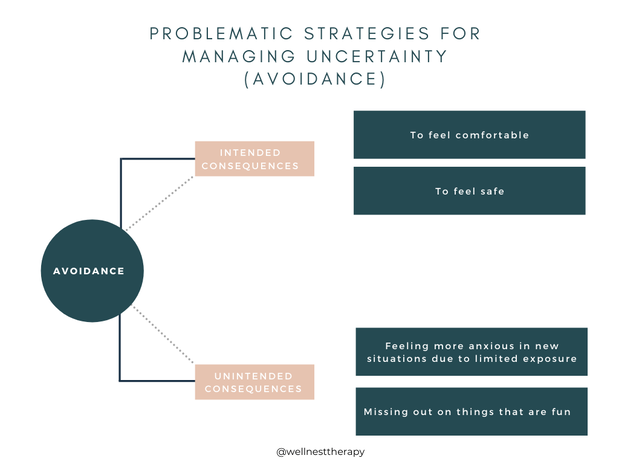I think at this point, it’s safe to say, things feel out of place for all of us – all over the world. Even though some cities and countries have started talking about reopening businesses and somewhat resuming some semblance of normalcy, we all know that many aspects of this pandemic are here to stay. What makes it more challenging is the fact that we still do not have any answers to many questions.
How long will wearing a mask be part of my daily routine? What restrictions are here to stay? When will I be able to travel internationally again without having to quarantine?
While we may not have the answers to these questions, click below for our top 3 strategies to manage uncertainty to help manage and relieve stress and anxiety.
In my world, we label this as intolerance of uncertainty (IU). People who are suffering from Generalized Anxiety Disorder (GAD) often experience intolerance of uncertainty. Behaviours associated with anxiety, such as worrying and avoidance, can be attempts to increase certainty in one’s life.
“Intolerance of uncertainty involves the tendency to react negatively on an emotional, cognitive, and behavioural level to uncertain situations and events.” – Dugas, Buhr, & Ladouceur (2004)
Problematic Strategies For Managing Uncertainty.
It is very normal to want to control things in your environment and avoid unpredictable situations.
Worrying
Worrying allows us to think about foreseeable potential negative consequences.
What this looks like is asking “what if?” questions. This leads to increased anxiety about the uncertainty because our minds typically run WILD in those situations.
When our minds run wild, they typically tend of be negative thoughts, which often times does not even happen! I can personally attest to that.
Once the “what if” questions start, so does the planning to fix these potential problems, thereby leading to a false sense of certainty.
Here is a quick overview of how worrying can be problematic strategies to manage uncertainty.
Avoidance behaviors tend to make us lean towards things that we are aware of and know of. Sticking to things that we know about can help make us feel safe.
For instance, if you’re used to having a steady routine of working out in the friendly confines of the gym, with familiar coaches and faces, working out alone at home in new and different ways than we’re used to may cause you to avoid working out. I know I personally miss the feeling that comes from the sense of community.
While missing a few workouts in the short-term isn’t a huge deal, avoiding certain situations or conversations can become problematic over time. Avoidance also limits your exposure to new opportunities and can cause anxiety in new situations. Additionally, avoidance will cause you to miss out on things that might have been enjoyable, like hitting new and different PR’s at home!
Research has shown that intolerance to uncertainty has been linked with other mental health concerns such as anxiety, depression, obsessive-compulsive disorders as well as eating disorders.
Here is a quick overview of how avoidance can be problematic strategies to manage uncertainty:
1. Uncertainty is part of life: Accepting that uncertainty is a part of our lives means will free you from the need to deny it. Rather than worrying, try being curious about it and following where that leads.
2. Embrace uncertainty: Rather than fighting uncertainty, embrace it! This will allow you to accept what is coming your way and cope better. Sometimes, you might find new ways to enjoy things!
3. Rethinking uncertainty: Ask yourself this – what if you were given the answers to every single step of your life. There would be no surprises, just plain jane life. Uncertainty can bring about new experiences, some great, some meh and some interesting.
Conclusion
COVID-19 has brought about a lot of uncertainty within our lives. Along with this uncertainty, come the ”what if” questions.
For me, my clinic has had to transition to supporting clients through phone and video sessions. For us at the gym, we’ve all had to transition working out at home, without total access to all the plethora of equipment that we’re used. Imagine looking back on this time in the future, what would you like to be able to say you accomplished? Walking into the uncertainty of this pandemic with a positive mindset will make a huge difference, just like visualizing a big lift is part of our success in the gym.
Which of the 3 tips will you use during these times of uncertainty?
Stay healthy, stay safe, and stay fit!
#Earnyour6s
Written By: Sarah Ahmed, Psychotherapist, Co-Founder of WellNest Psychotherapy
Read more: http://www.well-nest.ca/#ixzz6PiqVoDWD
Follow them: @wellnesttherapy on Twitter | wellnesttherapy on Facebook



